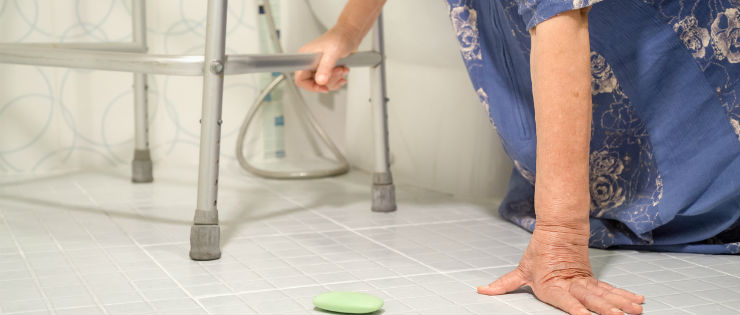
Falls in seniors can be deadly or life-changing. Brittle bones and skin can break easily in a fall resulting in lengthy hospital stays, decreased mobility and infections. Even minor injuries can take time to recover with some assistance required from others.
If you have an elderly parent or friend, learn what you can do to help prevent them from having a fall or recovering from their injuries if one has already occurred.
Prevention
Accidents happen, and often it doesn’t matter how vigilant we are, falls can’t be prevented. However, there are several things you can do to help prevent a fall in seniors.
- Steps should have sturdy handrails, good lighting and floor coverings that make it easy to see the steps and landing
- Footwear should be well fitted and still have plenty of grip on the underside
- Floor surfaces shouldn’t be slippery or have worn patches or rugs that can move easily
- Outside areas should be clean and kept free of moss in winter
- Install rails or a chair in the shower if required
- Encourage seniors to have their eyesight tested regularly.
There is plenty of handy information on the website Stay on your Feet, an initiative of the Western Australian government.
Risks
Remind your elderly friend to be careful getting out of bed during the day and night. They should sit up slowly and wait a moment before standing, so they are less likely to feel dizzy or off balance. A change in medication, illness or injury can change an older adult’s blood pressure or make them feel dizzy when they wouldn’t usually suffer. Going from a seated position on a chair to standing can also cause dizziness so encourage them to use the armrest or table for support.
If a Fall has Occurred
After a fall has happened, it is important a senior person knows what to do to get help. Run through the following points with your friend on what they should do if they fall or injure themselves.
- Don’t rush to get to your feet, try to stay calm on the floor
- Check to see if you have any breaks, pain or bleeding and if so, call 000
- If you can get to your feet, try to use some furniture to pull yourself up. If home alone, phone someone to say you’ve had a fall
- Stay warm with a rug or extra clothing, if possible
- Seek medical attention even if it is a graze for dressing by a professional to ensure it doesn’t become infected or ulcerated
Older adults who live alone and are at risk of a fall should be encouraged to wear an emergency call button, so they don’t need to reach a phone to alert someone for help.
First Aid
If you are the primary carer for an older person or someone they may call after a fall, it is advisable to make sure you have completed a recent first aid course, so you know what to do in the event of a broken bone, concussion or bleeding. The steps you take soon after an incident can improve their recovery time.
HIF Ambulance Cover
We hope you will never need to call an ambulance, but if you do you will want the fees covered. Check out HIF’s Ambulance Cover for details of benefits in your state.